|
|
|
Sort Order |
|
|
|
Items / Page
|
|
|
|
|
|
|
| Srl | Item |
| 1 |
ID:
172224
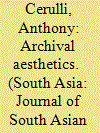

|
|
|
|
|
| Summary/Abstract |
Can the Indian manuscript and manuscript library be art? In what follows, I reflect on this question by examining a set of photographs I created for an art project called Manuscriptistan. I explain what it has meant for me to aestheticise Indian manuscript libraries and manuscripts, and I offer some insights about why it is important for scholars to bring sensual, spatial and artistic awareness to the things with which, and the spaces in which, they do their research.
|
|
|
|
|
|
|
|
|
|
|
|
|
|
|
|
| 2 |
ID:
189030
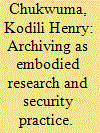

|
|
|
|
|
| Summary/Abstract |
This article explores the importance of embodiment in (research on) archival practices on state counter-terrorism policy in Nigeria. In doing so, the article seeks to contribute to the ongoing discussion around methodology and methods in critical security studies and other related fields in international relations by focusing on (researchers’) bodies as sites of knowledge production and intervention. Building on three empirical themes of fragmentation, labelling and gatekeeping that emerged from fieldwork in Abuja, Nigeria, I demonstrate how embodiment operates in active research contexts in the production – and problematization – of in/security. To do this, I draw inspiration from ideas around state archival practice; embodiment in critical security studies, especially as discussed in feminist and postcolonial work; and in/security theory to scaffold my broader methodological approach. A focus on embodiment, the article argues, marks the researcher’s body – and research – as integral to the development of theories and findings about security. At the same time, exploring the ways in which the (researcher’s) body is (re)produced in relation to identity and subjectivity encourages greater reflexivity in our research practice and fieldwork, as we are continually reminded that our work and our words are grounded in the standpoints that we occupy. The article concludes by identifying some useful strategies from my fieldwork for grappling with the challenges and tensions that emerge from bodily encounters in (security) research process.
|
|
|
|
|
|
|
|
|
|
|
|
|
|
|
|
| 3 |
ID:
163252
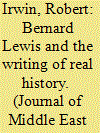

|
|
|
|
|
| Summary/Abstract |
Recent appraisals of Bernard Lewis’s career and scholarship have tended to neglect somewhat the research he carried out at London University’s School of Oriental African Studies (SOAS) before his move to Princeton in 1974. This early work resulted in important publications on Isma‘ilism, the Ottoman archives and modern Turkish history, but he also published highly influential books dealing with pre-modern Islamic history and culture. A survey of his early publications reveals certain recurring topics and preoccupations, including Isma‘ilism considered as a political and cultural revolution manqué, the potential dangers of a clash of civilizations, and Muslim responses to the challenges of modernization and Westernization. Lewis’s style and lucidity have contributed greatly to his influence as a historian.
|
|
|
|
|
|
|
|
|
|
|
|
|
|
|
|
| 4 |
ID:
147206
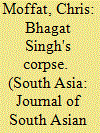

|
|
|
|
|
| Summary/Abstract |
This article explores how a sense of responsibility toward the revolutionary Bhagat Singh (1907–31) is mediated by and articulated through a relationship with the martyr's written remains. It considers how efforts to reconstruct ‘the real’ Bhagat Singh propel a polemic around the ‘proper’ subject of Indian politics, one that destabilises common sense nationalist narratives and extant autobiographies of the Indian Left. These interventions must, however, grapple with the anarchic potentiality of Bhagat Singh's self-sacrifice: empiricist efforts are tempted to engage in spectral practices of conjecture and counterfactual, building a politics of inheritance around a future that never came to pass.
|
|
|
|
|
|
|
|
|
|
|
|
|
|
|
|
| 5 |
ID:
087510
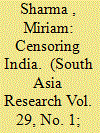

|
|
|
|
|
| Publication |
2009.
|
| Summary/Abstract |
During the early twentieth century, the emerging medium of cinema in British India became a distinctly contested political issue, revealing the tensions and limitations of empire. The record on cinematographic censorship indicates a number of competing interests and changing views, while political transformations and messy realities on the ground defied the efficacy of censorship. Even as many Indian filmmakers sought to convey messages of nationalist aspirations, the perceived need to guard against the revolutionary thoughts of communism and ideas from America that seemed to promote democracy and promiscuity fuelled censorship as a major multivocal imperial policy. Beset by many obstacles, it sought to control the exhibition of both Indian and foreign cinematic productions.
The article seeks to understand the genealogy of censorship derived from prior British attempts to regulate literary and dramatic productions. In the 1920s, anxieties about the maintenance of law and order and protection of British rule during a period of increasing Indian nationalist unrest had to be integrated with various concerns about deteriorating economic conditions. As Indian cinema struggled to come into its own, the issue of control became a central concern for both coloniser and colonised, while both faced threats from the influx of foreign (especially Hollywood) films.
The article also explores why it was deemed so important to bring cinema under the colonial gaze. While there was no unified front on how to deal with this new medium, it was perceived as highly in-fluential, with great potential for harmful or beneficial propaganda impacts. Finally, considerations of the competing demands of moral concerns were juxtaposed to the growing economic needs of the Indian film industry.
Throughout, it transpires from archival research how defining policy issues became ever more critical and how the complexities of implementation were made more difficult by the 'global' nature of policy formation as opposed to the more 'local' nature of the performance of control.
|
|
|
|
|
|
|
|
|
|
|
|
|
|
|
|
| 6 |
ID:
086650
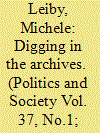

|
|
|
|
|
| Publication |
2009.
|
| Summary/Abstract |
This article explores the methodological obstacles to research on wartime sexual violence and the extent to which they can be overcome with archival research. It discusses issues of concept formation, counting victims of human rights abuse, and coding violations. It compares figures from the Peruvian Truth and Reconciliation Commission's final report, an analysis of the Commission's published materials, and an analysis of the primary documents and finds that (1) the number of reported cases of sexual violence is significantly higher than the 538 cited by the Commission, (2) men were more often the targets of sexual violence than previously thought, and (3) sexual humiliation and sexual torture were common practices during the war
|
|
|
|
|
|
|
|
|
|
|
|
|
|
|
|
| 7 |
ID:
172134
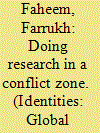

|
|
|
|
|
| Summary/Abstract |
This paper argues that in conflict zones like Jammu and Kashmir, the embodied stories of Kashmiris punctuate the past, often silenced by dominant Indian narratives. Narratives about certain key political events in the region's past co-exist with other forms of memory. Kashmiris weave these stories to make sense of the present, build connections to the past, and stake claims for the future. They build and nourish an archive based on lived experience, keeping a record of past wrongs. Novels, anecdotes and underground literature form part of this embodied archive, and provide a resource for recovering stories that remain silent in institutional archives which serve the interests of power. These interests are visible through restrictions on access to institutional archives, and demonstrate the effects of power and the overall politics of archives.
|
|
|
|
|
|
|
|
|
|
|
|
|
|
|
|
| 8 |
ID:
178710
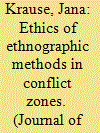

|
|
|
|
|
| Summary/Abstract |
This article examines the ethics of using ethnographic methods in contemporary conflict zones. Ethnographic research is an embodied research practice of immersion within a field site whereby researchers use ethnographic sensibility to study how people make sense of their world. Feminist, conflict and peacebuilding scholars who research vulnerable populations and local dynamics especially value ethnographic approaches for their emphasis on contextual understanding, human agency, egalitarian research relationships and researcher empathy. While immersion leads to knowledge that can hardly be replaced by using more formal approaches, it also elicits ethical dilemmas. These arise not only from the specific research context but also from who the researcher is and how they may navigate violent and often misogynous settings. I argue that many dilemmas may and perhaps should not be overcome by researcher skill and perseverance. Instead, ethical challenges may lead researchers to adopt limited and/or uneven immersion in their field site, not as failed or flawed ethnography but as an ethical research strategy that incorporates ethnographic sensibility to a varying extent. Examining why researchers may opt for limited and uneven immersion is important because in conflict research, stereotypes of the intrepid (male) researcher with a neutral gaze still tend to mute open discussions of how gender, race, ethnicity, nationality, class and other background factors inevitably shape immersion. This article seeks to contribute to creating discursive space for these conversations, which are vital for researchers to analyse, reflect and write from the position of a ‘vulnerable observer’ and incorporate greater transparency in the discussion of research findings.
|
|
|
|
|
|
|
|
|
|
|
|
|
|
|
|
| 9 |
ID:
092381


|
|
|
| 10 |
ID:
184801
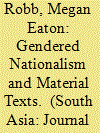

|
|
|
|
|
| Summary/Abstract |
While there exists a substantial body of work on the reformist writings and women’s periodicals of the late colonial period, this article contributes to a newer conversation extending analysis of print periodicals into the post-colonial period through a discursive and material analysis of Akhbār-e Khavātīn (Women’s Newspaper), a Karachi magazine from 1966 edited by a journalist named Mussarat Jabin. Paying attention to how a woman’s magazine was produced, collected and archived makes visible the previously invisible choices of print technicians, editors and collectors. Even though the conditions of many of these choices remain obscured, this article argues that attention to the material conditions of printing and archiving offer new avenues for reflection. Akhbār-e Khavātīn normalised women’s journalism, and also gestured towards the presence of male editors and owners, technicians who collaborated with the editors to create print periodicals, and towards the American archivists who sought to preserve the magazines for nationalist aims.
|
|
|
|
|
|
|
|
|
|
|
|
|
|
|
|
| 11 |
ID:
042093
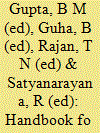

|
|
|
|
|
| Publication |
New Delhi, Information industry publications, 1985.
|
| Description |
v4(xiii, 323p.)
|
| Contents |
Vol 4: Asia-pacific cooperative information systems, networks and programmes
|
| Standard Number |
81851112045
|
|
|
|
|
|
|
|
|
|
|
|
Copies: C:1/I:0,R:0,Q:0
Circulation
| Accession# | Call# | Current Location | Status | Policy | Location |
| 028075 | 025.0954/GUP 028075 | Main | On Shelf | General | |
|
|
|
|
| 12 |
ID:
042094
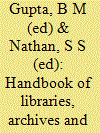

|
|
|
|
|
| Publication |
DelhI, Aditya Prakashan, 1985.
|
| Description |
v7(ix, 289p.)
|
| Contents |
Vol 7: Science and technology information systems and centres
|
| Standard Number |
818517945X
|
|
|
|
|
|
|
|
|
|
|
|
Copies: C:1/I:0,R:0,Q:0
Circulation
| Accession# | Call# | Current Location | Status | Policy | Location |
| 031701 | 025.0954/GUP 031701 | Main | On Shelf | General | |
|
|
|
|
| 13 |
ID:
042182
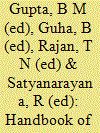

|
|
|
|
|
| Publication |
New Delhi, Information industry publications, 1986.
|
| Description |
v2 (378-877p.)
|
| Contents |
Vol 2: Libraries and archives
|
|
|
|
|
|
|
|
|
|
|
|
Copies: C:1/I:0,R:0,Q:0
Circulation
| Accession# | Call# | Current Location | Status | Policy | Location |
| 026384 | 025.0954/GUP 026384 | Main | On Shelf | General | |
|
|
|
|
| 14 |
ID:
042186
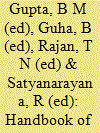

|
|
|
|
|
| Publication |
New Delhi, Information industry publications, 1986.
|
| Description |
v3(xiv, 255p.)
|
| Contents |
Vol 3: Information policy systams and networks
|
|
|
|
|
|
|
|
|
|
|
|
Copies: C:1/I:0,R:0,Q:0
Circulation
| Accession# | Call# | Current Location | Status | Policy | Location |
| 026385 | 025.0954/GUP 026385 | Main | On Shelf | General | |
|
|
|
|
| 15 |
ID:
042184
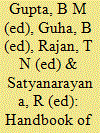

|
|
|
|
|
| Publication |
New Delhi, Information industry publications, 1987.
|
| Description |
v5(vi, 290p.)
|
| Contents |
Vol 5: Information Technology, industry and networks
|
| Standard Number |
8185112053
|
|
|
|
|
|
|
|
|
|
|
|
Copies: C:1/I:0,R:0,Q:0
Circulation
| Accession# | Call# | Current Location | Status | Policy | Location |
| 027311 | 025.0954/GUP 027311 | Main | On Shelf | General | |
|
|
|
|
| 16 |
ID:
082617
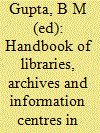

|
|
|
|
|
| Publication |
DelhI, Aditya Prakashan, 1991.
|
| Description |
v11(xxxviii, 454p.)
|
| Standard Number |
8185179689
|
|
|
|
|
|
|
|
|
|
|
|
Copies: C:1/I:0,R:0,Q:0
Circulation
| Accession# | Call# | Current Location | Status | Policy | Location |
| 033098 | 027.954/GUP 033098 | Main | On Shelf | General | |
|
|
|
|
| 17 |
ID:
027317
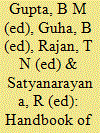

|
|
|
|
|
| Publication |
New Delhi, Information industry publications, 1984.
|
| Description |
v1(xvi, 368p.)
|
| Contents |
Vol 1: Libraries and archives
|
|
|
|
|
|
|
|
|
|
|
|
Copies: C:1/I:0,R:0,Q:0
Circulation
| Accession# | Call# | Current Location | Status | Policy | Location |
| 024784 | 025.0954/GUP 024784 | Main | On Shelf | General | |
|
|
|
|
| 18 |
ID:
175484
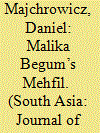

|
|
|
|
|
| Summary/Abstract |
Ostensibly, Muslim women in colonial India only rarely wrote travel narratives, particularly in Urdu. In truth, women’s travel writing in Urdu is anything but chimerical, but persistent archival and methodological limitations have led to the neglect and even irrevocable loss of this writing. A recalibrated approach to travel writing and archival practices divulges a vast corpus—but only if we attend to the specific ways in which women’s narratives were produced and circulated. This article offers a primary typology of the formats and fora most often employed by women writing in Urdu, including semi-private (but orally consumed) letters, family newspapers and women’s journals. Using extensive quotations from previously unknown sources, it reintroduces a forgotten corpus to the study of Indian history, literature, and gender studies alike.
|
|
|
|
|
|
|
|
|
|
|
|
|
|
|
|
| 19 |
ID:
158207


|
|
|
|
|
| Summary/Abstract |
As they pursue information and deploy violence during conflict, combatants compose, catalog, and preserve a wide variety of records, such as memos, investigative reports, and communiqués. In an increasing number of post-conflict scenarios, these records are being archived and released publicly, quickly becoming a critical new source of data for studies of peace and conflict. The objective of this special issue is to advance a new research agenda focused on the systematic analysis of conflict archives. The contributors each spent significant time collecting original data from often-dusty archives and, in many cases, developed new methodologies for sampling, cataloging, and analyzing historical documents. Their findings reveal how violence simultaneously shapes and is shaped by factors that remain largely unobservable using more conventional sources of conflict data, including clandestine mobilization, bureaucratic accountability, and political identities. By considering these studies in relation to one another, this introduction aims to provide readers with a comprehensive understanding of field research strategies and analytical techniques for studying original data from conflict archives. We conclude that while archival data are subject to their own biases that must be considered, this research agenda addresses significant limitations associated with traditional data sources and, in turn, pushes scholars to rethink many of the mechanisms underlying the causes and dynamics of peace and conflict.
|
|
|
|
|
|
|
|
|
|
|
|
|
|
|
|
| 20 |
ID:
188228


|
|
|
|
|
| Summary/Abstract |
This article maps the internationalization of the Palestinian cause by studying the participants, groups, and themes at Palestinian solidarity conferences held in 1969–70. Examining such conferences reveals the extent of communication and ideological debate between the Palestine Liberation Organization (PLO) and international solidarity activists at an important juncture in the internationalization of the Palestinian liberation movement. The article makes the methodological point that international conferences organized by the PLO and other Palestinian institutions can function as an alternative archive that complements the traditional archives of diplomatic and intellectual history. Read in tandem with extant Palestinian sources, the paper trail left by international conferences mitigates the scattered and precarious status of Palestinian archives.
|
|
|
|
|
|
|
|
|
|
|
|
|
|
|
|
|
|
|
|
|